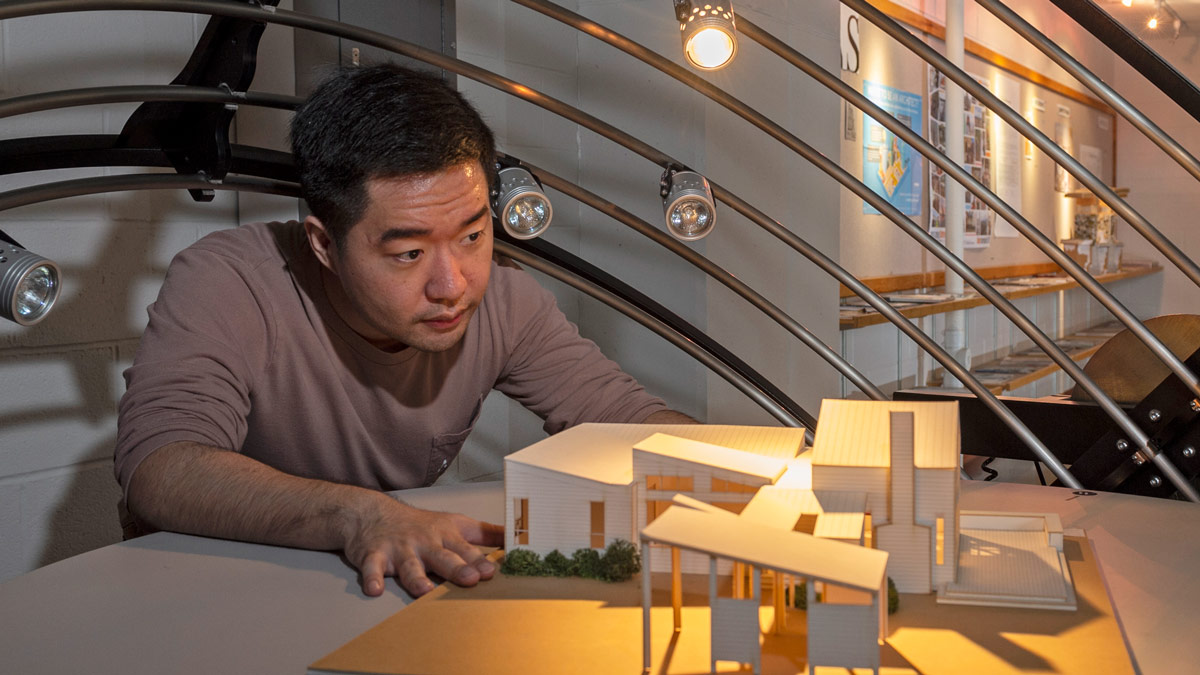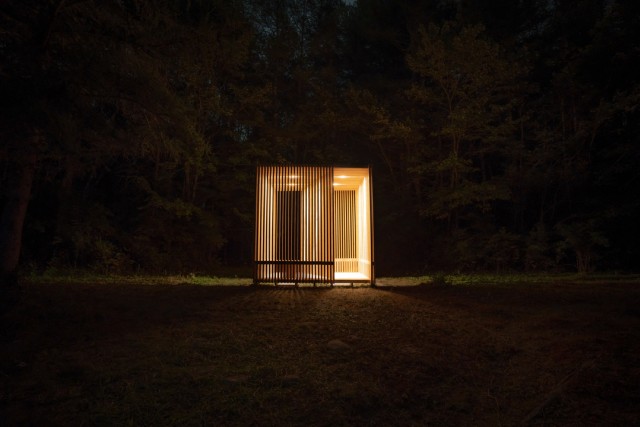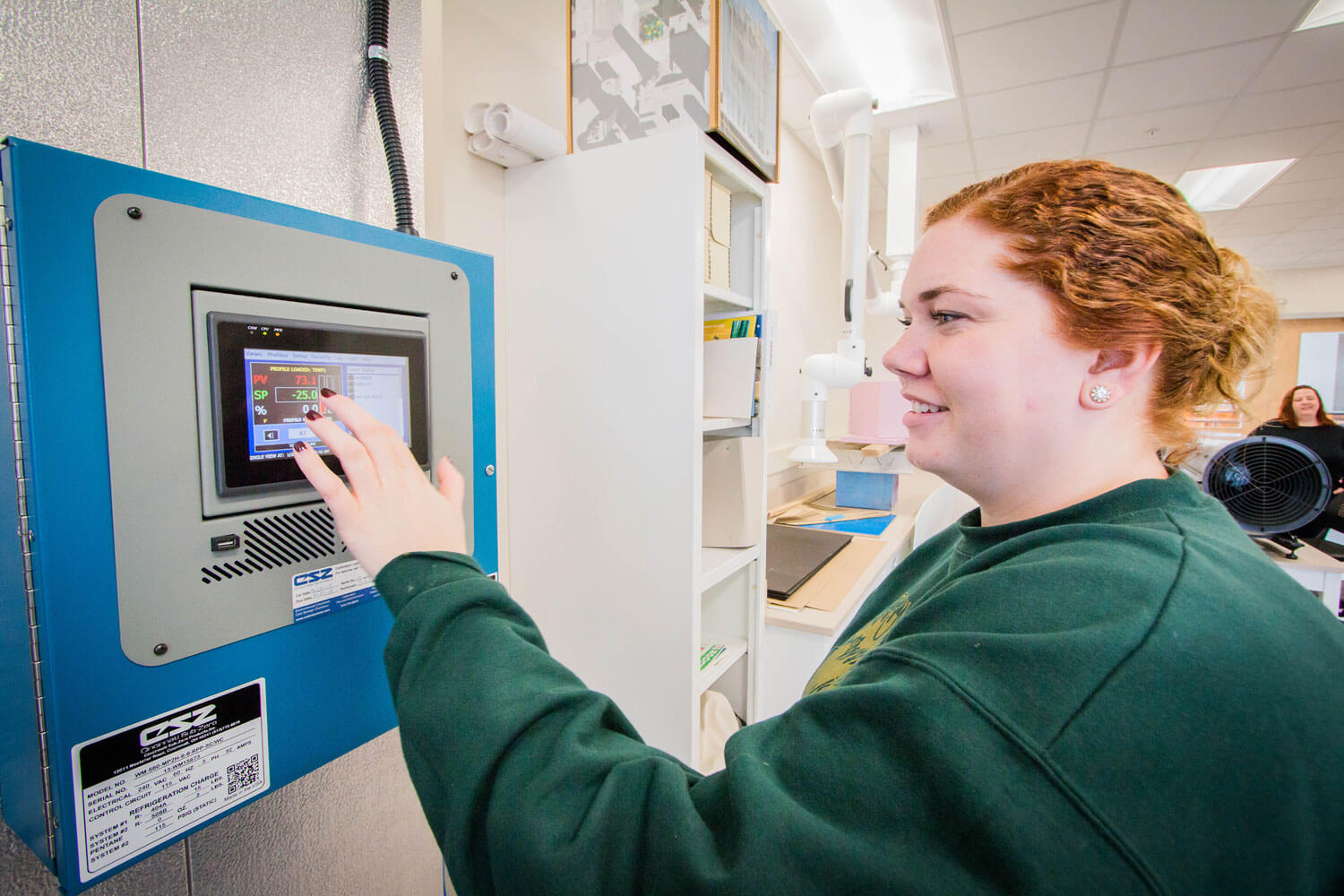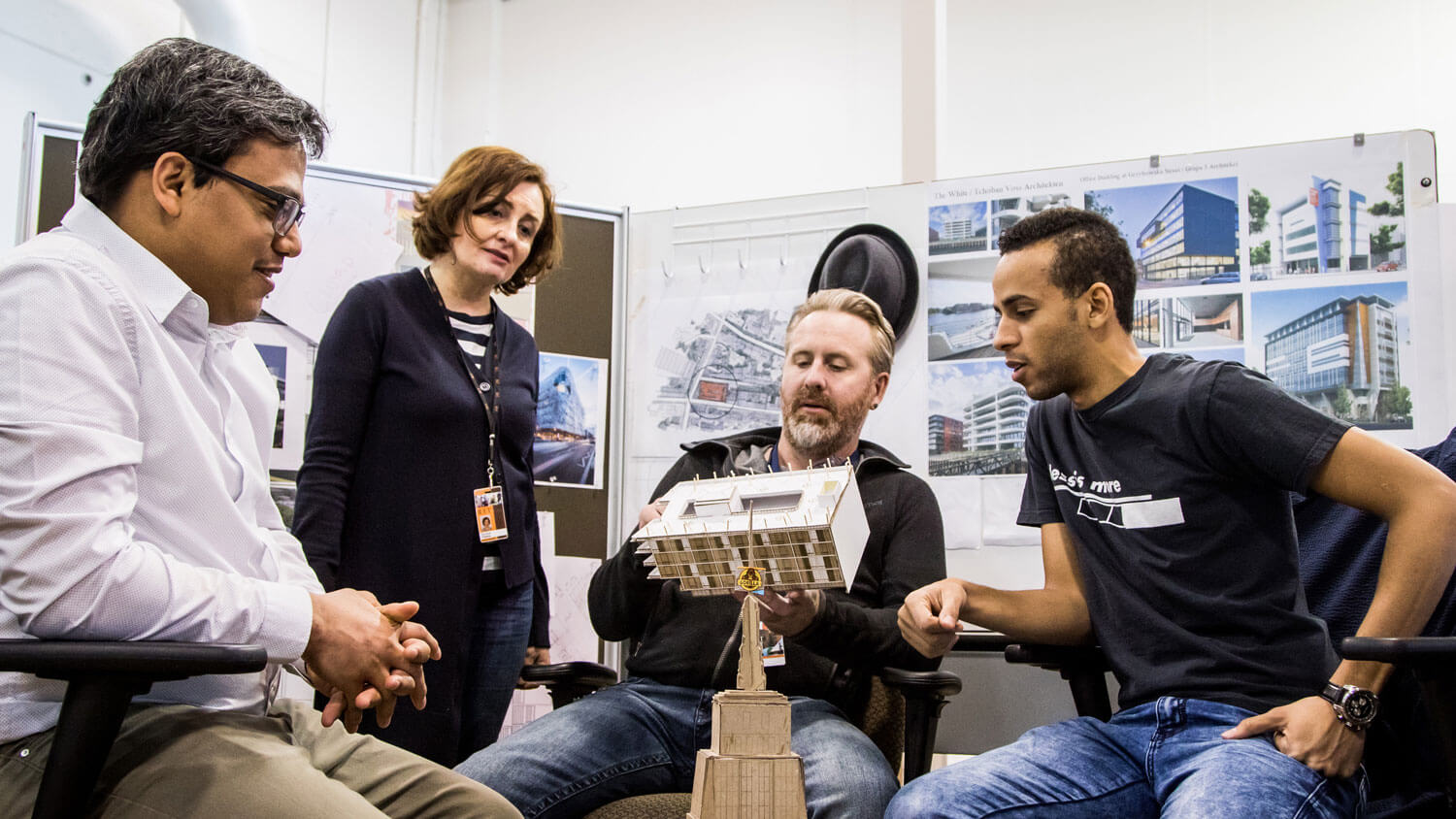Architecture Master of Architecture Degree

Architecture
Master of Architecture Degree
- RIT /
- Golisano Institute for Sustainability /
- Academics /
- Architecture M.Arch.
Blend design, research, and sustainability in RIT’s NAAB-accredited master’s in architecture.
Overview for Architecture M.Arch.
Why Study RIT's Master of Architecture Program?
STEM-OPT Visa Eligible: The STEM Optional Practical Training (OPT) program allows full-time, on-campus international students on an F-1 student visa to stay and work in the U.S. for up to three years after graduation.
An emphasis on design: The program’s studio curriculum integrates construction technologies, material science, and mechanics into design.
Gain hands-on career experience: A professional co-op helps you build your resume before you graduate.
On campus or online options: study in a traditional on-campus experience and through a 100% online setting.
Sustainability concerns are changing how we think about architecture. Buildings account for a large percentage of the world’s energy expenditures and carbon emissions, which has driven demand for more sustainable architecture. In RIT’s accredited master of architecture program, we’re moving sustainability forward to elevate the value of architectural design. As a student here, you’ll learn how to design with context and substance in areas such as positive energy, performance building, climate-responsive designs, passive resiliency, and more.
Our accredited architecture program offers an immersive program focused on investigating the complexity of designing buildings with people, space, and the environment in mind. Whether you have a background in the building design sector or are new to the field, the program will prepare you for a path to positively contribute to the design of tomorrow’s buildings, neighborhoods, and communities.
Our program offers foundation courses as well as more in-depth classes exploring integrated building systems, urban planning, industrial ecology, and more. You’ll also have the flexibility to choose electives in other subject areas based on your unique talents and career goals, such as business, engineering, energy, or additional design skills.
RIT's Master of Architecture Program: What Sets Us Apart
- Design matters: As a program emphasizing design, the program’s core education takes place in the studio. Our studio curriculum integrates construction technologies, material science, and mechanics into design.
- Hands-on education: Expect a hands-on learning environment, working on real-world projects and utilizing our 75,000-square-foot, LEED Platinum-certified building to observe and test building efficiency. The City of Rochester and the western New York region also serve as an active learning environment for our students.
- Work experience: A professional co-op will help you build your resume before you graduate. RIT’s cooperative education program lets you work in the field with local architects and present neighborhood improvement ideas to planning boards.
- Global experience: Our global experience requirement lets you experience new cultures, settings, and contexts to expand your understanding of diverse architectural interests and needs.
- STEM-designated: Our program is STEM-designated, which increases scholarship and research opportunities for students, and offers up to two additional years of work/study for international students.
- NAAB-accredited: We’re one of the few master of architecture degree programs in the U.S. to be accredited by the National Architectural Accrediting Board (NAAB)—that means you’re getting one of the best architecture educations in the country.
- Thesis: Our thesis option allows you to integrate everything you learn into a comprehensive project. Past student theses include designs for an urban master plan for Rochester’s downtown, a net-zero or positive energy building, and a turbine system to harvest rainwater for energy.
- On-campus or online: Our program is offered in both a traditional on-campus experience and through a 100% online setting.
M.Arch. Courses: What You'll Learn
In RIT's M.Arch. degree, you will engage in a comprehensive curriculum that covers a range of courses in areas as diverse as:
- Sustainability: With a global need for a more sustainable world, including buildings and their impact on energy consumption and carbon footprints, the focus of many courses reflect the conditions of sustainable design and practice.
- Technology: Design exploration is enhanced through the understanding of the implication of technology on both design process and product. The program enables students to focus and collaborate in many specialized areas of technology, including engineering, computer science, imaging science, materials and construction, and products and remanufacturing.
- Urbanism: The complexity of the urban environment requires an interdisciplinary approach to architecture education—one that references economics, public policy, sociology, and regional culture. With this in mind, the program also focuses on the practices and principles of preservation and adaptive reuse.
- Integrated Learning/Practice: From the outset, students often approach design problems within teams, learning to value and leverage collective and collaborative participation. Through integrated learning and evidenced-based models, we prepare students for the increasingly integrated practice of architecture, where architects are orchestrating teams of professionals from a variety of fields, including engineering, management, science, and computer science.
Program Settings
RIT's master of architecture program is available in a traditional on-campus setting or through a fully online format. The program also provides advanced standing or standard admission tracks for both the on-campus and online settings. We work with each student individually to determine the best setting and track and can customize course requirements based on levels of prior experience.
- Campus: Designed as a full-time in-person program, courses are offered on campus in the fall and spring semesters, primarily during the day, and often include open periods between classes to allow time for students to gain work experience with an architectural firm while they complete their degree.
- Online: Designed as a flexible and remote program, courses are offered through 100% online instruction during the fall, spring, and summer semesters using both synchronous and asynchronous instruction. This flexible format allows time for students to gain work experience with an architectural firm while they complete their degree from any location.
Program Tracks
- Standard Track: For those students with no prior experience or background in architecture, the standard track requires you to complete a three-year, 90-credit curriculum. Campus students typically complete this in six semesters (three fall; three spring). Online students typically complete this track in nine semesters (three fall; three springs three summer). Both campus and online students must start this program in the fall term in order to complete it in three years.
- Advanced Track: For students with previous experience and an undergraduate degree in architecture, the advanced track requires you to complete a two-year, 60- or 63-credit curriculum starting in a fall term. Campus students complete this in four semesters (two fall; two spring). Online students typically complete this in six semesters (two fall; two spring; two summer). Both campus and online students must start this program in the fall term in order to complete it in two years.
Architecture Careers
RIT’s master of architecture program has a 100 percent job placement rate among our graduates. Our alumni are employed in architectural firms around the world and are working in diverse fields, from community development to smart growth to green building materials. Within firms and elsewhere, they serve as architectural designers, research scientists, sustainability consultants, planning engineers, start-up entrepreneurs, and more. Plus, our professional co-ops are a compelling program requirement that often leads to employment offers from architects and other firms working in construction, urban design, and facilities management.
Innovation Through Diversity
Enhancing the value of design requires constructive collaboration and a breadth of skills and viewpoints, interwoven in a way that elevates and celebrates everyone’s differences and strengths at RIT. Behind our focus on creativity and innovation is a dedication to diversity and inclusion that is fundamental to our mission. The master of architecture degree is suited for students with or without a background in the architecture or sustainability fields. Many of our students have been former art teachers, film students, engineers, interior designers, lawyers, and more before beginning their studies. They bring these backgrounds to the program in ways that enriched conversations and perspectives about design and human needs. Plus, approximately one-third of our students are international students, bringing cultural experiences and architectural design concepts from every continent.
Careers and Salary Info
Typical Job Titles
| Architect (upon licensure) | Project Designer | Project Manager |
| Intern Architect | Sustainable Design Specialist | Building Science Specialist/Technician |
| Assistant Professor |
Featured Work and Profiles
-
Central Avenue Gateway: "Central Crossing"
Doug Templeton, Xingyan Wang, Yao Yao This project looked at the entire block of Central Avenue between St. Paul Street and N. Clinton. Located adjacent to Rochester's Central Rail Station, this project proposes to reuse historic...
Read More about Central Avenue Gateway: "Central Crossing" -
Domus Aqua Inn & Suites
Blair A. Benson Domus aqua or “Water House” represents a bringing together of the harmony represented in nature, the hospitality of home, and the ever-persistent forces that bring about change in our daily lives. The...
Read More about Domus Aqua Inn & Suites -
Joseph J. Nicholson III ’19
"The RIT GIS Master of Architecture degree will help me to better evaluate current processes and trends in my building designs. Its emphasis on the fundamentals of architecture combined with...
Read More about Joseph J. Nicholson III ’19 -
Sabyasachi Das ’17
"Coming from a technical mechanical engineering background RIT Architecture department has played a transformative growth role in the last two years in bringing the best of me as a design individual...
Read More about Sabyasachi Das ’17 -
JD Harper ’15
"The complex problems of our generation call for trans-disciplinary and multi-faceted solutions, and the GIS program certainly offered a highly interactive and creatively stimulating environment to...
Read More about JD Harper ’15 -
Boutique Hotel
Yao Yao The proposal is to create a boutique hotel on the site that will provide spectacular views of the falls as well as offering 5-star service and amenities. The Hotel will be a vision of the Rochester of...
Read More about Boutique Hotel
Curriculum for 2025-2026 for Architecture M.Arch.
Current Students: See Curriculum Requirements
Note for online students
The frequency of required and elective course offerings in the online program will vary, semester by semester, and will not always match the information presented here. Online students are advised to seek guidance from the listed program contact when developing their individual program course schedule.
Admissions and Financial Aid
This program is available on-campus or online.
| Offered | Admit Term(s) | Application Deadline | STEM Designated |
|---|---|---|---|
| Full‑time | Fall; Spring considered with advanced standing | Fall - February 15 priority deadline, rolling thereafter; Spring - rolling | Yes |
| Part‑time | Fall or Spring | Rolling | No |
Full-time study is 9+ semester credit hours. Part-time study is 1‑8 semester credit hours. International students requiring a visa to study at the RIT Rochester campus must study full‑time.
Application Details
To be considered for admission to the Architecture M.Arch. program, candidates must fulfill the following requirements:
- Complete an online graduate application.
- Submit copies of official transcript(s) (in English) of all previously completed undergraduate and graduate course work, including any transfer credit earned.
- Hold a baccalaureate degree (or US equivalent) from an accredited university or college. A minimum cumulative GPA of 3.0 (or equivalent) is recommended.
- Satisfy prerequisite requirements and/or complete bridge courses prior to starting program coursework.
- Submit a current resume or curriculum vitae.
- Submit a personal statement of educational objectives.
- Submit two letters of recommendation.
- Entrance exam requirements: None
- Submit a portfolio. View portfolio requirements.
- Submit English language test scores (TOEFL, IELTS, PTE Academic, etc.), if required. Details are below.
English Language Test Scores
International applicants whose native language is not English must submit one of the following official English language test scores. Some international applicants may be considered for an English test requirement waiver.
Duolingo (DET): 130
IELTS: 6.5
LanguageCert Academic: 74
PTE Academic: 60
TOEFL: 88/4.5
International students below the minimum requirement may be considered for conditional admission. Deaf and hard-of-hearing test takers with significant hearing loss do not need to take the listening and speaking sections for the TOEFL and IELTS. Each program requires balanced sub-scores when determining an applicant’s need for additional English language courses.
How to Apply Start or Manage Your Application
Cost and Financial Aid
An RIT graduate degree is an investment with lifelong returns. Graduate tuition varies by degree, the number of credits taken per semester, and delivery method. View the general cost of attendance or estimate the cost of your graduate degree.
A combination of sources can help fund your graduate degree. Learn how to fund your degree
Additional Information
Prerequisites
Applicants are expected to have successfully completed one semester of a college-level math course.
Advanced Standing Track for Spring Admit Term
The Advanced Standing track provides an option for students to start in the spring term; however, due to course sequencing, spring start students must take courses over 5 semesters (3 Spring & 2 Fall). The Spring admit term is only available for applicants pursuing the Advanced Standing Track. To qualify for advanced standing, applicants must have previous experience and an undergraduate degree in architecture.
Online Study Restrictions for Some International Students
Certain countries are subject to comprehensive embargoes under US Export Controls, which prohibit virtually ALL exports, imports, and other transactions without a license or other US Government authorization. Learners from the Crimea region of the Ukraine, Cuba, Iran, North Korea, and Syria may not register for RIT online courses. Nor may individuals on the United States Treasury Department’s list of Specially Designated Nationals or the United States Commerce Department’s table of Deny Orders. By registering for RIT online courses, you represent and warrant that you are not located in, under the control of, or a national or resident of any such country or on any such list.
Accreditation
Related News
-
September 29, 2025

RIT faculty member and students create peace art installation at Woodstock site
RIT architecture Professor Amanda Reis and students designed and built the ‘Peace Pavilion’ at Bethel Woods for BuildFest 2: Peace Rises.
-
January 22, 2025

New architecture faculty member challenges students to see beyond a building’s walls
An architect and educator, Amanda Reis wants to inspire students in RIT’s master of architecture (M.Arch.) program to practice architecture in a way that is interdisciplinary and community-oriented.
-
November 20, 2024

RIT professor helps to tackle energy access in rural Africa
Williams’ collaborative work tackles the subject of energy access in Sub-Saharan Africa. In 2015, the United Nations established Sustainable Development Goal 7 to ensure access to affordable, reliable, sustainable, and modern energy for all.
Contact
- Karen Palmer
- Interim Director of Graduate Admissions
- Office of Graduate Admissions
- Enrollment Management
- 585‑475‑5656
- kbpges@rit.edu
- Seth Holmes
- Interim Department Chair
- Golisano Institute for Sustainability
- 585‑475‑7535
- shharch@rit.edu














